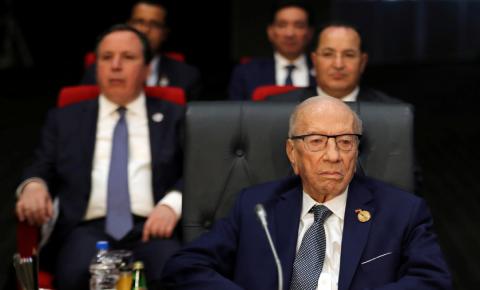Advertisement
Tunisia's Essebsi, leading figure in democratic transition, dies
TUNIS (Reuters) - Tunisia’s 92-year-old president, Beji Caid Essebsi, a major player in the north African country's transition to democracy after a 2011 revolution, has died, the presidency said on Thursday.
He was taken to a military hospital on Wednesday.
A leading figure in the country's fortunes since 2011, Essebsi was hospitalized late last month and spent a week in hospital after suffering what authorities described as a severe health crisis.
"On Thursday morning, the President of the Republic died at the military hospital in Tunis ... The burial ceremony will be announced later," the presidency said in statement.
According to the constitution, the speaker of parliament will temporarily serve as president.
Essebsi has been a prominent politician in Tunisia since the overthrow of veteran autocrat Zine El-Abidine Ben Ali in 2011, which was followed by uprisings against authoritarian leaders across the Middle East, including in nearby Libya and Egypt.
Parliamentary elections are expected to be held on Oct. 6 with a presidential vote following on Nov. 17. They will be the third set of polls in which Tunisians have been able to vote freely following the 2011 revolution.
Essebsi had limited powers compared with Ben Ali, and was mainly responsible for foreign and defence policies.
Tunisia has been hailed as the only democratic success of the Arab Spring uprisings against dictatorship, with a new constitution and free elections in 2011 and 2014.
But political progress has not been matched by economic advances. Unemployment stands at about 15 percent, up from 12 percent in 2010, due to weak growth and low investment.
Tunisia has been spared much of the violence seen elsewhere in the Middle East since 2011, although it has been the target of militant Islamists over the years.
Government troops have been battling militant groups in remote areas near the border with Algeria, while high unemployment has also stoked unrest in recent years.
After the overthrow of Ben Ali, Essebsi led the immediate transition as prime minister in 2011. He was elected president three years later. Essebsi had also been a senior figure before 2011, having served as foreign minister under state founder Habib Bourguiba and parliamentary speaker under Ben Ali.
(Reporting by Tarek Amara; Writing by Michael Georgy; Editing by Alison Williams, William Maclean)



















Add new comment